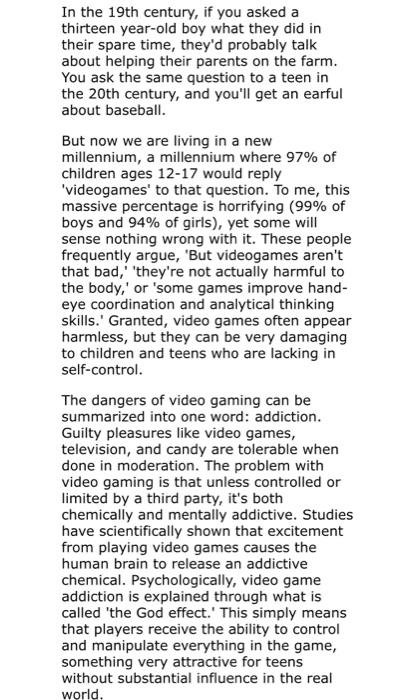summary for this passage
English

In the 19th century, if you asked a thirteen year-old boy what they did in their spare time, they'd probably talk about helping their parents on the farm. You ask the same question to a teen in the 20th century, and you'll get an earful about baseball. But now we are living in a new millennium, a millennium where 97% of children ages 12-17 would reply 'videogames' to that question. To me, this massive percentage is horrifying (99% of boys and 94% of girls), yet some will sense nothing wrong with it. These people frequently argue, 'But videogames aren't that bad,' 'they're not actually harmful to the body,' or 'some games improve hand- eye coordination and analytical thinking skills.' Granted, video games often appear harmless, but they can be very damaging to children and teens who are lacking in self-control. The dangers of video gaming can be summarized into one word: addiction. Guilty pleasures like video games, television, and candy are tolerable when done in moderation. The problem with video gaming is that unless controlled or limited by a third party, it's both chemically and mentally addictive. Studies have scientifically shown that excitement from playing video games causes the human brain to release an addictive chemical. Psychologically, video game addiction is explained through what is called 'the God effect.' This simply means that players receive the ability to control and manipulate everything in the game, something very attractive for teens without substantial influence in the real world. Unlike other addictions such as tobacco, marijuana, or alcohol, video game addiction has yet to attain major publicity. The reason is probably due to the how smoking and drinking accumulates direct physical injury, while video games conjure minimal damage to physical health. However, I believe video game addiction endangers victims equally as much as substance addiction. Compared to tobacco and heroin, video games require much more time to actually perform the addictive act. Smokers often engage in other activities with a cigarette between their lips, but video gamers do not have the same privilege when gaming. Studies show that the average male gamer plays for around six to eleven hours a day on weekends and about an hour on weekdays. This excessive time consumed on video games is time that could have been spent doing homework, playing sports, or even being with friends. Video game addiction is a relatively new discovery, and the amount of publicity focusing on it will gradually increase. But as consumers, we should not wait until video games are publicly acknowledged as harmful and addictive. Parents need to start limiting their children's time spent on gaming. Wellness classes in schools should include a section about non- substance addiction (like video games) in their curriculums. We must raise awareness about the harmful effects of prolonged gaming before it becomes game over for our youths. Video Game Addiction by Alan Ridgefield









